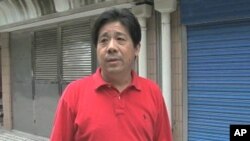As China hosts the World Exposition in Shanghai, there is an alternative exhibit that authorities do not want people to see, an Internet petition launched by dissident writer and human rights activist Feng Zhenghu. Authorities have restricted Feng to his home, but foreign journalists have been allowed to visit with him. Feng is making a difference, trying to promote change in his country.
Standing on the balcony of his apartment in Shanghai, Feng Zhenghu watches the traffic passing below. He says that the locatioon allows him to wave at petitioners who have come to China's business capital to seek his help in taking their grievances to government officials.
But that is as close they can get because Feng is virtually a prisoner in his own home.
"You could say I am not free, but sometimes I can go out for a walk," said Feng. "To say that I am free is not always accurate either because whenever the word comes down from on high, I can't go anywhere."
Even before the opening fanfare of Shanghai's World Expo, Feng Zhenghu has been living in limbo. His situation worsened late last month when he launched an online critique of the city and what he calls a "Shanghai Expo of Unjust Cases."
"The cases [in the critique] are very typical and are an account of the persecution I've faced while fighting for rights," added Feng. "They reflect some basic examples of problems in China regarding personal freedom, freedom of publication, freedom of speech, Internet freedom and judicial inequities -- all of which I've experienced myself."
Authorities quickly shut down the Internet exhibit and took Feng to police headquarters for questioning. Authorities confiscated his computers, printers and other equipment with little explanation.
It was not the first time that Feng Zhenghu has had problems with the authorities. Late last year, he gained international attention after staging a protest at Tokyo's Narita International Airport. Feng camped out at the airport to protest China's refusal to let him fly home. In February, after spending 90 days in the airport, he returned to China. A month later, he says, Chinese authorities began restricting his movements.
When he was imprisoned from 2001-2004, for allegedly breaking Chinese publication laws, Feng says he learned the importance of understanding the country's legal system.
"From that point on, while I was in prison, I began studying and gaining an understanding of all of our laws. It was then that I started to realize that those of us who are political or involved in politics cannot do anything without understanding China's laws," he said. "If you don't, then you just pitting one ideology against another, clashing one belief with the next."
In Shanghai, Feng has made a name for himself, helping those who have been forced out of their homes across China to voice their objections to the government.
Despite his situation, Feng says he is hopeful about China's future because the country's legal systems are being established. He says he is confident that after economic liberalization will come the liberalization of human rights.
Feng stresses that he has never called on anyone to oppose the government or the Communist Party, and that he wants the authorities to act in accordance with Chinese law.
"For me and for the rest of the public as well, there is only one thing we need to do to change China and that is to overcome our fear, the fear that is in our hearts and insist on the truth in life," he said.











